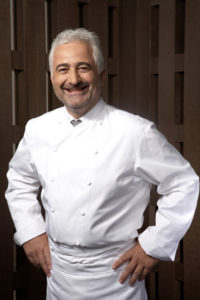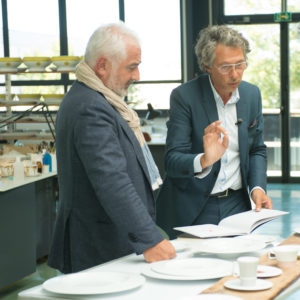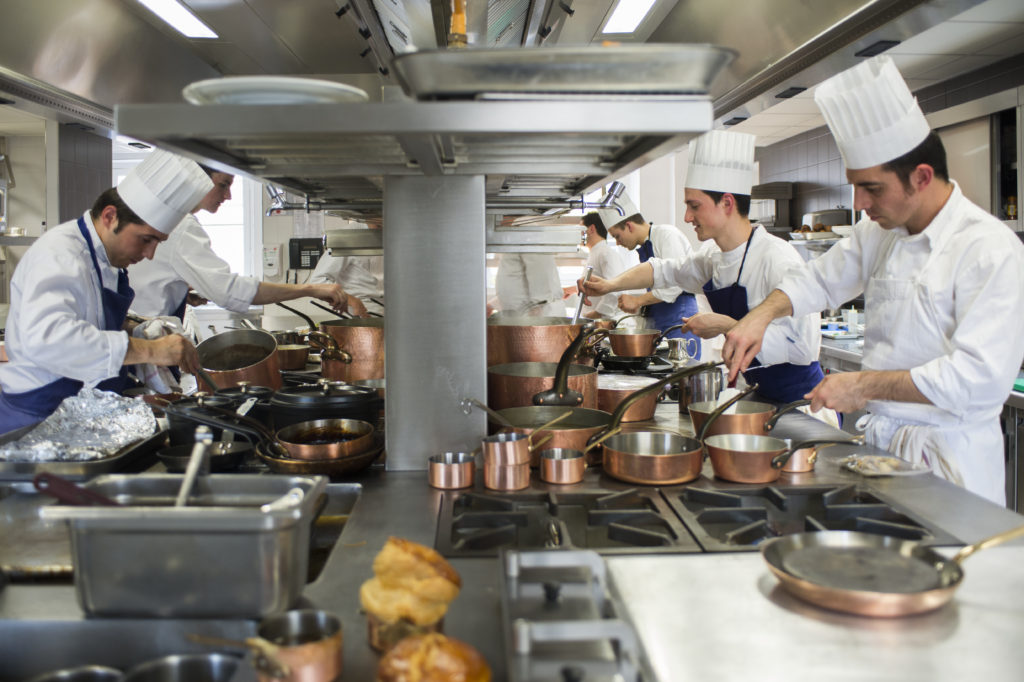
I was very honoured that you asked me to intervene regarding the future of French gastronomy during the day devoted to the future of heritage, as part of the Global Gatherings. I thank you for that and I will try to live up to the task!
For that purpose, it should be accepted as a principle that a future cannot be conceived without heritage because in order to build something solidly it is necessary to have a base of quality. Heritage is thus designed to no longer be a monument set in the past, it is our past and, at the same time, our future.
Gastronomy, hereupon, is a perfect example, since it is both the work of the generations that preceded us and a true ode to life. As for cooking, it is, as I have written in bright letters at the reception of my restaurant: “the art of instantly transforming products that are loaded with history into joy”.
Gastronomic heritage is regarded by all of us as one of the largest in the world, but is it still alive and well?
French gastronomy is a living heritage because it is in permanent interaction with other heritages and trades such as French terroirs, products, producers, the food service industry, tableware and also interior architecture, all characterized by great diversity.
Let me illustrate this point by mentioning some examples of the exceptional diversity of our products and terroirs, fruit of a generous nature where everything is cultivated, fished, plucked, and gathered: potatoes can be from Ratte du Touquet, Noirmoutier, Bintje, or Agata; asparagus can be white in the north or green and purple in the south; as for wines, obviously, they represent the greatest diversity of grape varieties and terroirs.
Then there is the multiplicity of regional specialties; there isn’t a single village in France that doesn’t have its specialty: garlic in Arleux, chitterlings in Vire, pasties in Pezenas, sausage in Toulouse, not to mention preparations such as sauerkraut in Alsace, hotpot in Auvergne, Cassoulet in Castelnaudary…
The food service industry is never left behind since the cities of France can pride themselves on offering pork butchers, butchers, tripe makers, poultry farmers, bakers, confectioners, greengrocers, cellar masters…
The food service industry comes into play to create plates, glasses, cutlery and dishes while table objects are often the work of artists.
Interior designers are obviously asked to create the environments most adapted to the personality of each chef and his kitchen.
Chefs, in constant connection with all these trades, push back the boundaries; their requirement of quality gives back life to abilities and skills as well as to local productions and drive producers and craftsmen along in their approach. This is the guarantee of a living gastronomic heritage.
______
 Another facet of gastronomic heritage is the acquisition of know-how that is passed on from generation to generation.
Another facet of gastronomic heritage is the acquisition of know-how that is passed on from generation to generation.
Cooking is a manual craft, that is to say with gestures, and the transmission of these gestures is never as good as when learnt, because learning consists in observing the master’s gestures and saying to oneself: one day, I will be able to do the same.
Agriculture (in its broad sense: breeding, fishing, viticulture…) is also a profession of gestures and it too is learned and transmitted by practice. Peasant roots are fundamental in French gastronomy. Farmers have a great capacity for observation; they know how to learn from their experience. For example, if Bresse chicken has such a particular flavour, it is because the farmers, for years, have understood from their observation the interaction between this bird and the land on which it lives, the two enrich one another.
Today’s Frenchmen benefit, without fully realizing it, from knowledge accumulated and transmitted from generation to generation, from master to student. I am a link in this chain of transmission because I was an apprentice and I now have apprentices in my restaurant. I am very proud of it.
All these professions are rewarding, they allow the expression of sensitivity, personality, and they arouse enthusiasm. By transmitting these trades, one transmits a culture, a knowledge, a history, a gesture which will give birth to a passion. This transmission is a guarantee of the lively character of French gastronomic heritage.
______
Chefs are thus passionate people. Farmers and tableware designers too. The world of gastronomy is a world of passionate people. Each morning I am very keen in front of the quality and the freshness of the products which are delivered to us by cultivators, fishers, winegrowers, and breeders. This get-up-and-go attitude is common to all artisans and all business leaders that are the men and women of the world of gastronomy.
A business leader must constantly reinvent himself, question himself, a craftsman too. Our restaurants are SMEs, it is the pledge of our hunger for life to renew ourselves, to adapt, to create. And for that, we do not need a Research and Development department… we just want to please our guests!
In gastronomy professions, one must be optimistic and full of vitality. Paul Bocuse was a flamboyant example; he embodied generosity coupled with constant enthusiasm.
We embody, we the gastronomic professionals, a French art of living which is related to an art of happiness: it is the heritage of happiness! And this heritage resonates through our lives and leads wise observers like the journalist Maurice Beaudoin to write: “Fortunately, the French excellence at the table still exists“.
This is why French gastronomy shines; this is why our gastronomic heritage is not only alive, but is doing well, which guarantees a future, as we shall see.

How can we ensure a future for our gastronomic heritage?
The classification by UNESCO of the “French Gourmet Gastronomy” in the Cultural Heritage of Humanity led to the observation that culinary practices were factors of a cultural identity. In doing so, this ranking has been a trigger to the domain of gastronomy. Most countries then realized the existence of their gastronomic culture and their ability to aspire to such recognition. The recognition of our gastronomy has revealed worldwide cuisine. France has thus shown the way. And this path has been taken by countries from all continents, which have helped to give a future to gastronomic heritage.
The List, in this respect, has been a wonderful revelation: we have seen Asian cuisine (China, Korea), formerly confined to a “cheap” ethnic niche, develop in the upscale. Between 2018 and 2019, some 40 restaurants in Korea and China have joined the world’s thousand best restaurants. Spain, the United States, and Great Britain have more and more restaurants on the List. Russia is developing a high-end gastronomy and some of its chefs are interested in the rich culinary history of their country. Finally, we observe the first signs of a quality upgrading in Africa.
This revival of cuisines from around the world has led young chefs from all countries to come to France in order to learn in the best restaurants. They learn the techniques and discover the multitude of our products and especially the soul of French culture.
There is now all over the world a gastronomic search, a proliferation of ideas and culinary creations, an explosion of restaurant openings. Many young people want to learn how to cook. All this is relatively recent; it is a turning point in the history of gastronomy, it is a real “movement” at the origin of which we find French gastronomy.
______
French gastronomy now lives through itself as much as internationally, as the gastronomy of other countries live through themselves as much as through French gastronomy. Cuisine is doing well, very well, because it gathers people and gives as much pleasure to those who prepare it as to those who taste it.
Cuisine doesn’t need a passport: we now see that the Americans don’t hesitate to stay for hours at the table, the English love the atmosphere specific to each restaurant, the Japanese have great chefs that have gone through our kitchens, the Chinese whose essential stops within their trip to France are restaurants, the Italians who share our convictions in the importance we give to products…
Chefs now have access to international products. Paul Bocuse, outstanding chef and communicator, travelled the world to display French cuisine, and the world finally came to us!
This opening led cooks to the realization of new dishes, new recipes, while keeping their own technical bases and local roots. It is an opening that, instead of going towards standardization, cultivates creativity and personalization. We can say that more has happened in the domain of gastronomy in the last twenty years than in the two thousand years that preceded them!
An ultra-fast acceleration for a hyper-solid heritage! In short, a flourishing health and an assured future for gastronomy!
______
Finally, it is through the growth of tourism that one sees the good health of French gastronomy. Tourists’ first motivation in their choice of destination, France, is the discovery of our gastronomy and our wines. They see the discovery of our culture and our landscapes as a dip in the good life.
They also buy and take home many tasty souvenirs and then go on to buy French products in their own country. The sale of wines, for example, is one of the few surplus positions in our trade balance with a total of 13 billion Euros.
More and more men and women are discovering French gastronomy; they are sensitive to it, they are interested in it and take with them new ideas about it to their country. At the same time, French people are also going to discover the gastronomy of other countries and the inspiration thus works both ways.
This new trend has led gastronomy to new horizons, where value creation no longer rests on products and services but rather on the creation of singular experiences. Guests are now looking for what is unique, not what is best. So our challenge to make every guest happy is through the human side; it is a beautiful ingredient for the future of French gastronomy as for the future of gastronomy worldwide.
______
You asked me what would be the future of French gastronomy and I realize that my answer has slipped towards the future of gastronomy as a whole. But it is because the evolution of French gastronomy is at the origin of the evolution of worldwide gastronomy and that henceforth, the future of one cannot be conceived without the future of the other. This is also the best tribute that the world can give to France in this field.
“You chefs, you make the ephemeral unforgettable” a guest once told me at the end of a dinner; and the unforgettable travels without borders… and it does so for a long time!

















